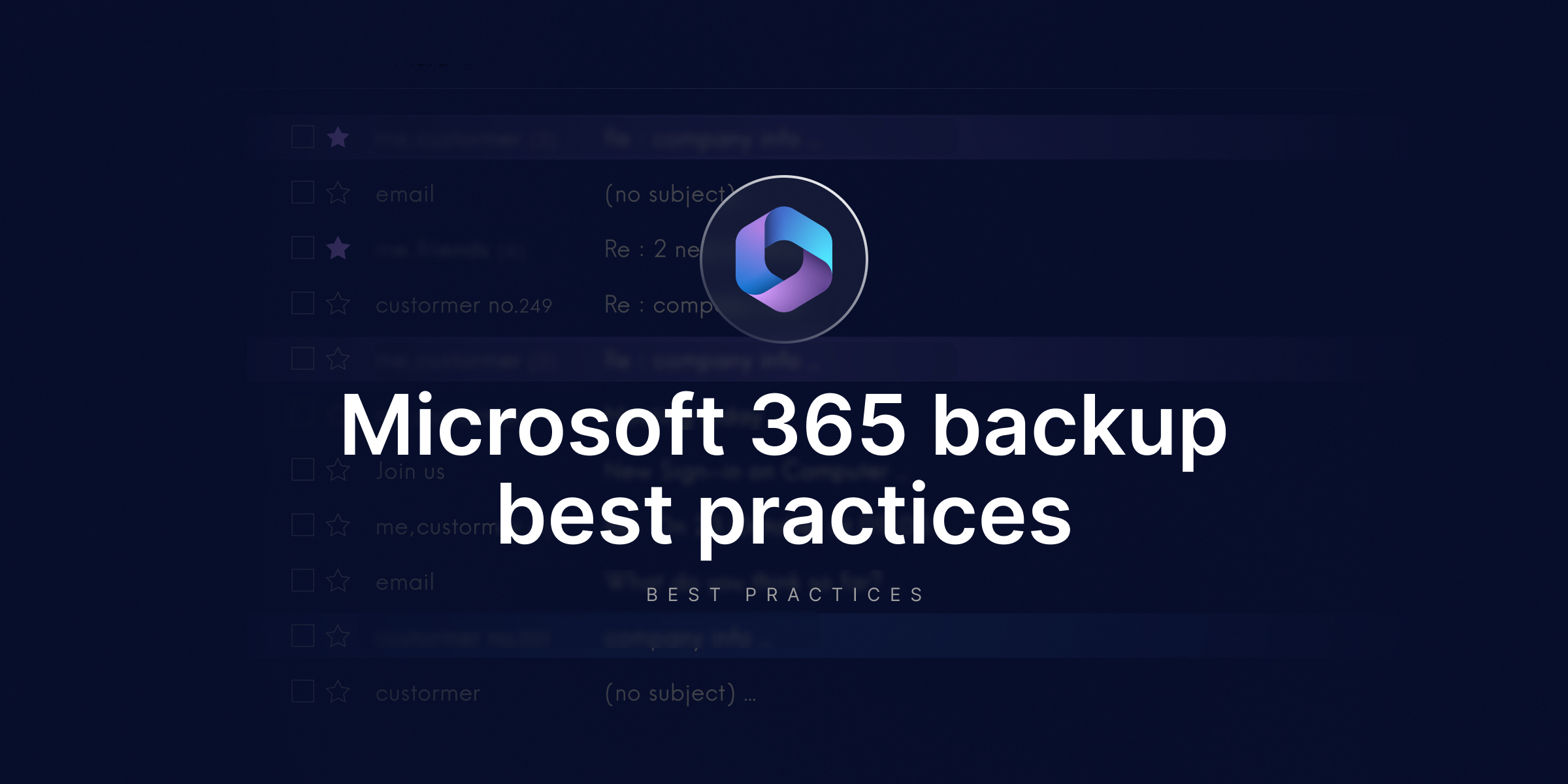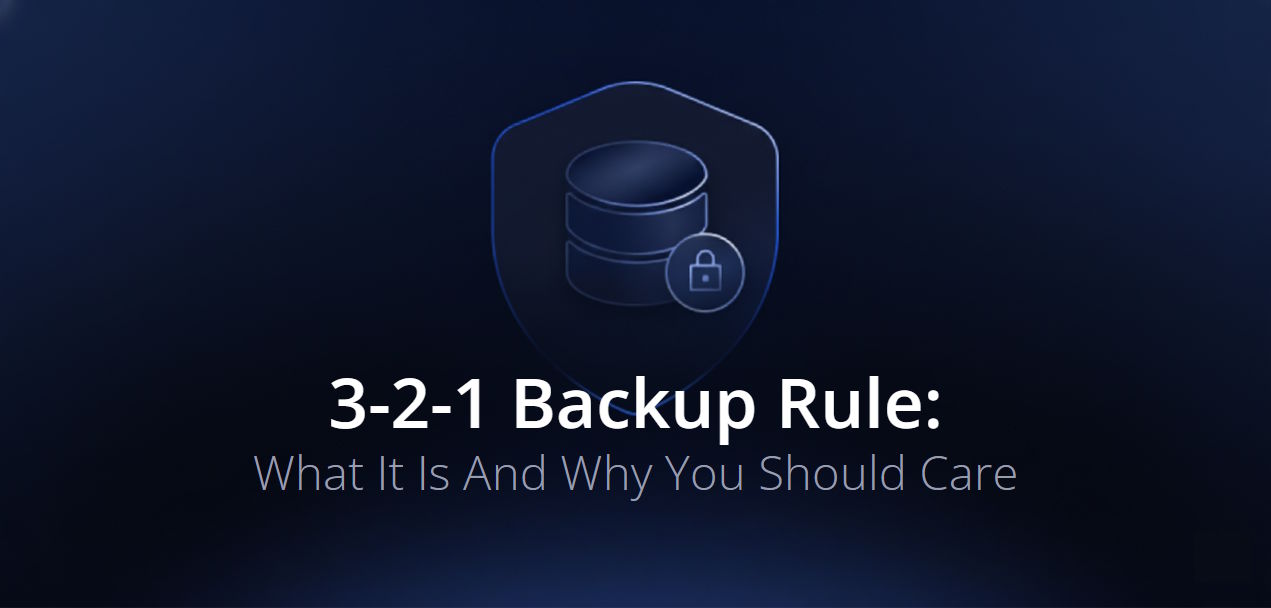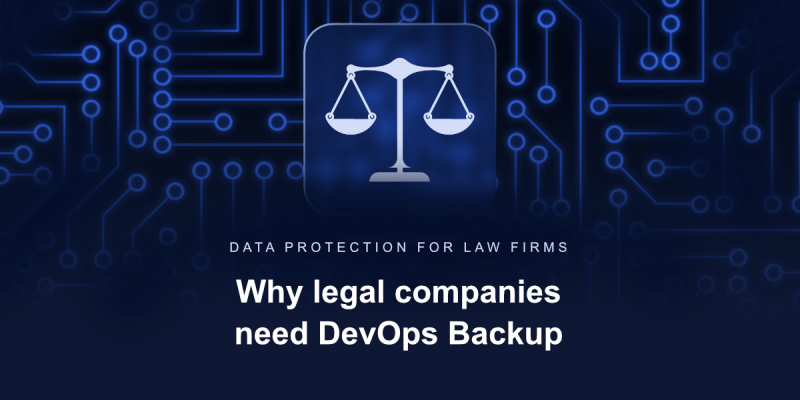
Data Protection for Law Firms: Why Legal Companies Need DevOps Backup
Software supports business operations in healthcare, finance, e-commerce, and legal tech as well. Many organizations build legal tech software that streamlines document management, automates legal workflows, ensures compliance, and enhances collaboration for legal professionals.
Key Insights:
🔹 Legal tech companies handle highly sensitive client data and must meet strict compliance standards (GDPR, NIS2, ISO 27001, SOC 2).
🔹 Under the shared responsibility model, platforms guarantee uptime, but data protection and recovery remain the user’s duty.
🔹 Even short outages can disrupt legal operations and breach compliance requirements.
🔹 Backups are essential to maintain business continuity, protect intellectual property, and meet regulatory mandates.
🔹 A proper solution must cover repositories and metadata, allow granular or full disaster recovery, and support multi-cloud or on-prem storage.
Nearly all legal tech companies rely on some sort of DevOps platforms and tools to maintain the velocity and reliability of their software development and project management processes. But are there any pitfalls?
Despite the fact that DevOps brings together software development and business operations for legal tech, the benefit still comes with numerous risks.
Organizations operating in the legal industry can easily become victims due to issues threatening DevOps platforms. Though legal tech isn’t among the top targeted industries in 2024, according to GitProtect’s recent survey, the CISO’s Guide to DevOps Threats (technology and software, fintech and banking, media and entertainment turned out to be the most attractive to cybercriminals), Still, a lot of legal companies are at risk.
For example, the Law Society Gazette states that cyber attacks on law firms increased by 77% over the past years. What’s more, they say that law firms are among the prime targets when it comes to ransomware attacks.
The CISO’s Guide to DevOps Threats also revealed that GitHub alone experienced 165 incidents of different disruption impact in 2024, while Jira faced 10 major impact issues with 17 hours of disruption total during the year. Could organizations that rely a lot on DevOps and project management tools experience disruption during that time? Well, compliance laws and regulations require legal tech organizations to ensure business continuity… and backup is one of those measures that can help ensure it.
Legal technology companies develop software platforms that manage everything from contract automation to legal operations to client-sensitive data. Those companies also carry the burden of compliance, risks, and data protection.
Tools like GitHub, GitLab, Bitbucket, or Azure DevOps help track code changes, manage issues, and facilitate CI/CD workflows, but they are not backup solutions on their own. DevOps platforms do not back up repositories and metadata. Neither do they offer full protection against accidental or malicious deletion of repositories or ransomware attacks.
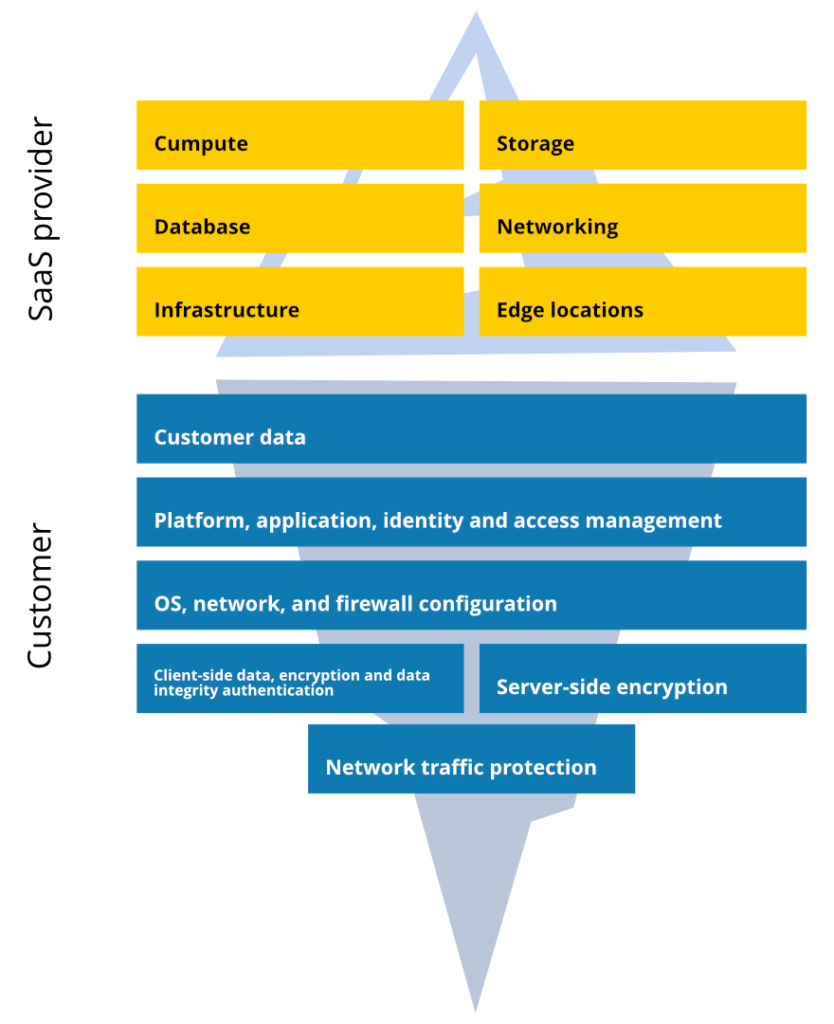
Under the shared responsibility model, a platform promises availability and uptime, but data protection, retention, and recovery remain the user’s responsibility. Without dedicated backups, IT teams can lose critical intellectual property, project history, or compliance-related records that cannot be easily recreated.
Use GitHub, GitLab, Atlassian, or Azure DevOps? Check the Shared Responsibility Model of the service provider you rely on:
📌 GitHub Shared Responsibility Model
📌 GitLab Limited Liability Model
📌 Atlassian Cloud Shared Responsibility Model
📌 Azure DevOps Shared Responsibility Model
Compliance challenges legal organizations can face
Companies providing tech for the legal sector have very rigid regulatory compliance requirements to meet. Among those policies, directives, and acts are SOC 2, ISO 27001, NIS2, FISMA, GDPR, and DORA. If summed up in the context of legal tech solutions, all these compliance documents speak about establishing:
- strong controls and procedures to protect sensitive data and systems handling it
- a structured approach to managing data security risks
- robust cybersecurity measures and incident response plans
- assurance that government, financial, or personal information stays confidential while its integrity and availability are preserved
Without reliable backups, even a minor disruption can lead to significant financial and legal consequences. And fines for failing to meet regulatory compliance regulations can go up high… take NIS2, for example — non-compliance can cost essential entities up to €10 million or 2% of global annual revenue, and important entities up to €7 million or 1.4%…
Example? A data breach at the Orrick law firm in 2023 exposed confidential information (personal data) of 600,000+ individuals, followed by lawsuits amounting to $8 million. Hackers accessed the names, addresses, dates of birth, and Social Security numbers that were contained in files held by Orrick.
Cyber threats facing legal tech
Cyber risks in legal tech aren’t theoretical. Companies dealing with legal operations are highly time-sensitive. Legal firms need to demonstrate their ability to recover fast from:
- ransomware and malware attacks
- accidental deletions or user errors
- system failures or misconfigurations
- data breach or security breach
Legal software providers still need to catch up with resilience and best recovery practices. For instance, those happen due to service outages. As an example, let’s remember a massive Jira outage in April 2022 that affected 700+ Atlassian clients who couldn’t access their critical data for around a fortnight.
In 2023, a ransomware attack targeted CTS, a U.K.-based provider of managed IT services for law firms and the professional services industry. The company experienced a cyberattack, leaving over 80 legal firms without access to their critical case files.
Another plausible scenario could shake up any DevOps infrastructure at a legal company: the team uses GitHub for version control, Jira for issue management, and Confluence for internal documentation. A DevOps engineer mistakenly deletes a critical repository or misconfigures a CI/CD pipeline that wipes important staging data.
With a proper DevOps backup solution in place, organizations can instantly restore the deleted repository with all related metadata, as well as project data. Thus, organizations can minimize operational disruption, or, what’s worse, data loss.
How GitProtect’s DevOps backup helps legal companies with data protection
GitProtect gives the legal sector not only a fighting chance to protect sensitive data security and ensure resilience but also an automated solution fine-tuned to fit any rigorous security and compliance standards.
Automated backups to ensure business continuity
GitProtect allows organizations to automatically back up critical DevOps and project management data, covering GitHub, GitLab, Bitbucket, Azure DevOps, and Atlassian Apps, like Jira and Bitbucket. GitProtect delivers fully automated, custom policy-based backups with a schedule configurable to meet the strictest RTO and RPO.
With GitProtect, legal tech organizations can back up not only repositories but also metadata, which is essential for managing critical and sensitive workflows.
To meet the strictest regulatory compliance and legal requirements, GitProtect permits organizations to choose the deployment model (SaaS or on-prem). If organizations go with SaaS options, they can choose their data residency within their needs (EU/US/AUS/custom).
Restore and Disaster Recovery to meet any event of failure
When data incidents strike, GitProtect can help organizations restore data fully or granularly (just the most needed data) from any point in time. Moreover, the backup and Disaster Recovery solution allows various restore destination options, including the possibility to restore to the same or a new GitHub, GitLab, Azure DevOps, Bitbucket, or Jira account, to the local device, or cross-over recovery to another git hosting service (e.g., from GitLab to GitHub, Azure DevOps, or Bitbucket).
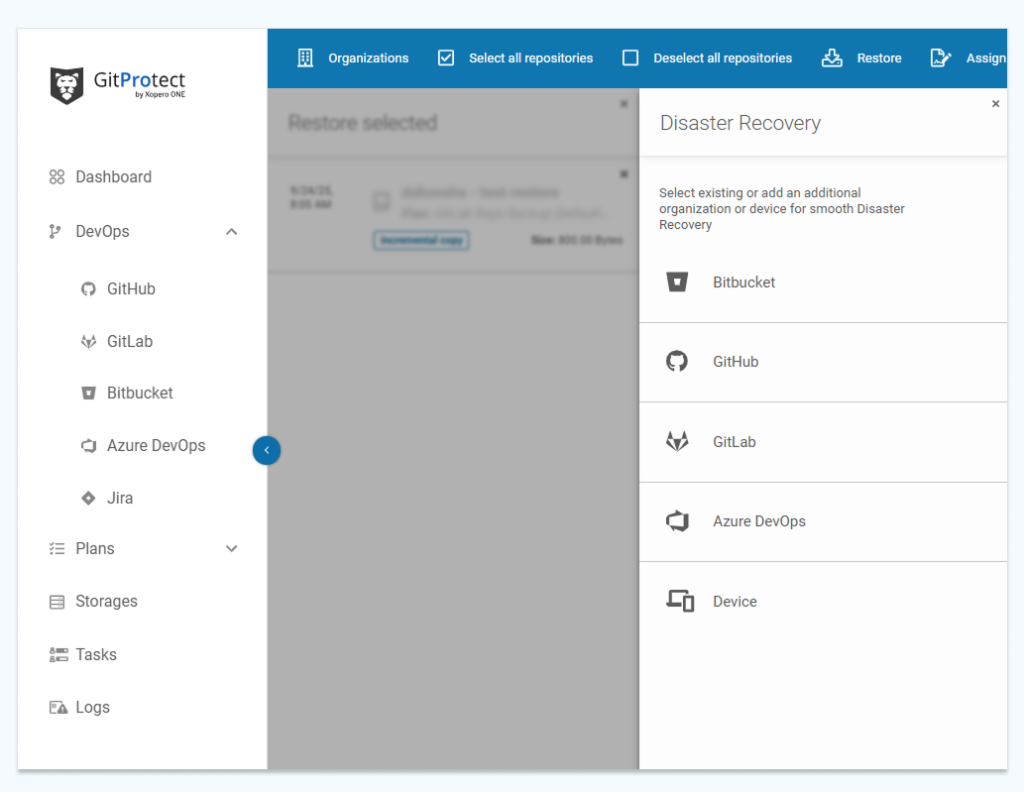
Such a wide range of restore and Disaster Recovery capabilities allows organizations to ensure that in any disaster scenario, the organization will be able to restore its data, minimizing data loss – whether it’s a service outage, infrastructure downtime, ransomware attack, human error, or any other event of failure.
“As the Founder of Legal Aspirations, […], it was important for me to ensure that my data is secure and recoverable in the event of any data loss.”
— Li-Yen Poon, Founder of Legal Aspirations
Read the full story of how Legal Aspirations, a service helping couples draft fair Family Court property settlements, adopted GitProtect.io backups for GitHub to ensure cyber resilience.
What’s more? With GitProtect, organizations can easily test their Disaster Recovery to meet regulatory compliance requirements regarding resilience.
Flexible storage & compliance assurance
GitProtect supports unlimited retention policies and allows multi-storage capabilities, including free GitProtect Cloud, AWS S3, other S3-compatible platforms, or on-premise storage to help organizations meet the 3-2-1 backup rule and ensure resilience.
Meet reporting requirements
Legal firms gain full visibility into their backup operations from GitProtect’s data-driven and intuitive dashboard. Administrators can monitor backup health, storage usage, and SLA compliance. Also, GitProtect allows users to instantly generate downloadable audit reports on backup operations.
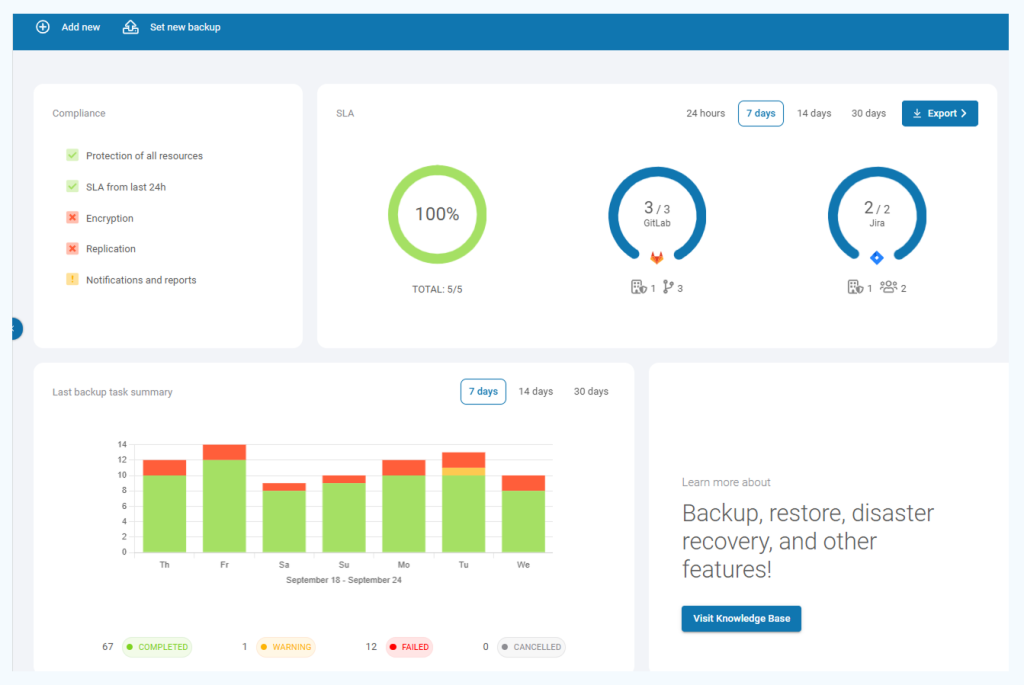
Conclusion
Legal tech software providers need to juggle a few things: service availability for customers and cyber resilience to uphold the most demanding compliance standards, like those of federal and state regulators. This operational agility ties to all DevOps workflows executed through code repository platforms. What’s the ultimate goal of backup in all this? It’s characterized by:
- automated, policy-driven backups
- compliance-ready architecture aligned with data security practices and regulations
- seamless restore options minimizing downtime
- reduced the footprint of human error or external threats
- operational peace of mind for developers, legal tech providers, and their clients
In the legal industry, where every clause counts, every source code commit does too — and backups make sure nothing slips through the cracks.
[FREE TRIAL] Ensure compliant DevOps backup and recovery with a 14-day trial 🚀
[CUSTOM DEMO] Let’s talk about how backup & DR software can help you mitigate the risks in the legal tech sector



